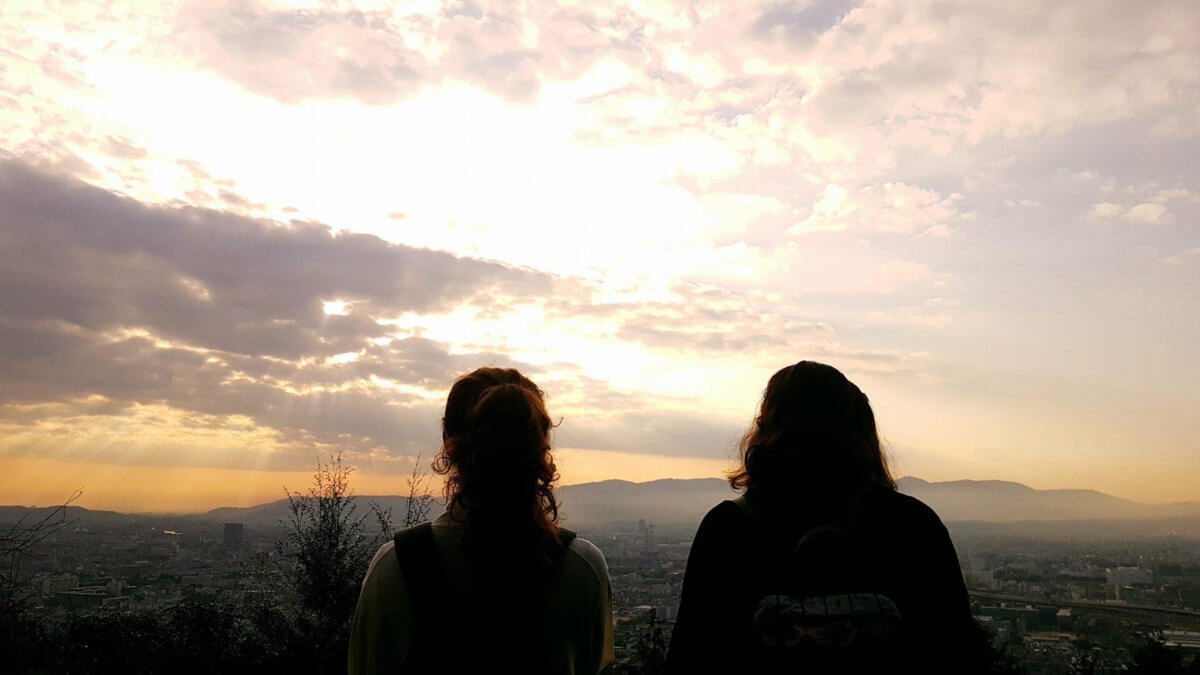If you’ve ever travelled overseas, you would be well acquainted with the excited “how was your trip?!” bombardment of questions that tend to await you upon returning home. I, too, had experienced this many a time, and would often reply enthusiastically enough, “Yeah, good thanks!” It wasn’t until I had studied abroad, however, that I began to conjure up more passionate descriptions: amazing, incredible, unforgettable. I was lucky enough to spend five weeks in Kyoto, Japan, studying an intensive course of Japanese language and culture. Being quite introverted myself, the idea of spending five weeks sharing a tiny room with three other people, quite frankly, sounded like a nightmare, but this did not weaken the magical allure of Japan that drew me in regardless.
The study experience itself was brilliant. Suddenly we ate, breathed and lived Japanese. We had three hours of language class every day, which was a lot of brainwork for a bunch of students who were lucky to get in an hour of Japanese a few times a week before this. The cafeterias on campus may quite possibly be my favourite memory of the trip in general. The food was not only cheap, it was delicious and was given out in generous servings – not to mention they served my favourite Japanese food, Taiyaki. We ate our lunch with Japanese students every day, which was a really great way to make friends and practice our Japanese with native speakers. My fondest memory of these conversations was when we attempted to explain some of Australian culture to our new friends and observed their shock and horror when we showed them what a mullet looks like. After classes, we had cultural activities, where we were exposed to a number of elements of Japanese culture we’d never experienced before. These ranged from a cooking class with an expert sashimi chef, to a Taiko drumming class, to playing games with Geiko and Maiko (types of Japanese Geishas). Studying Japanese culture in Australia could never have given me the immersive experience I received whilst in Kyoto.
This immersion really struck me when we went to Fushimi Inari shrine as a group. It is situated on a mountain, and we made our way up through a series of orange Tori gates with numerous small shrines along the way to the top. Of course, we expected an amazing view upon reaching the top. However, our Japanese friend Daisuke, who had evidently done this walk a thousand times before, insisted that he show us a better view. We followed as he ducked and weaved behind a smaller shrine area and past a “danger” sign. Slightly apprehensive, we trusted his judgement, and we suddenly reached a clearing. Like something out of a movie, we had emerged from a cluster of stone and ornaments into an open area on the side of the mountain that looked out onto all of Kyoto. The sun was just beginning to set, colouring the sky in beautiful deep oranges and pinks. At first, we were all chatty with excitement at the discovery, but before long we’d fallen into silence, just admiring the incredible view before us. This experience among many others taught me the value of travelling with locals – they always know the best views.
Japanese locals are like no others when it comes to hospitality. The kindness of Japanese people and their constant desire to be good hosts is something that amazed me from the very beginning of our study program. The teachers and program organizers consistently surpassed any regular expectations we’d had to ensure we were all as comfortable as possible. I also saw this hospitality at play when staying at a hostel in Osaka. The main motivation behind choosing this particular accommodation was the super cheap price, so I wasn’t expecting anything particularly fancy. Upon arrival, I was greeted by a lovely guy, Ren, who seemed to truly care about who his guests were and where they’d come from, and gave us brilliant recommendations for places to eat and shop. Later on in the stay, we happened to be leaving the hostel at the same time, and Ren insisted on walking us all the way to the cheesecake shop we were looking for, helping us to practice some Japanese and telling us more about Osaka along the way. This kind of above-and-beyond hospitality became characteristic of my interactions with Japanese people.
Naturally, before leaving Australia, I’d had many anxieties about my trip. The aforementioned rooming situation, whether or not I’d get sick of Japanese food and if I could handle the claustrophobia of a Tokyo subway at rush hour. I wasn’t sure if I could keep up with the study and still have time to sightsee. I wasn’t confident with my Japanese and thought I’d embarrass myself when I tried to use it in practical situations. None of these worries played on my mind for even a day after reaching Japan and I’m glad I didn’t let any of them get in the way of my decision to go. Studying abroad was an experience that truly changed the way I view both study and travel and gave me fresh motivation not only for continuing Japanese, but also for hopefully studying overseas again in the future.
We acknowledge the Ngunnawal and Ngambri people, who are the Traditional Custodians of the land on which Woroni, Woroni Radio and Woroni TV are created, edited, published, printed and distributed. We pay our respects to Elders past and present. We acknowledge that the name Woroni was taken from the Wadi Wadi Nation without permission, and we are striving to do better for future reconciliation.
